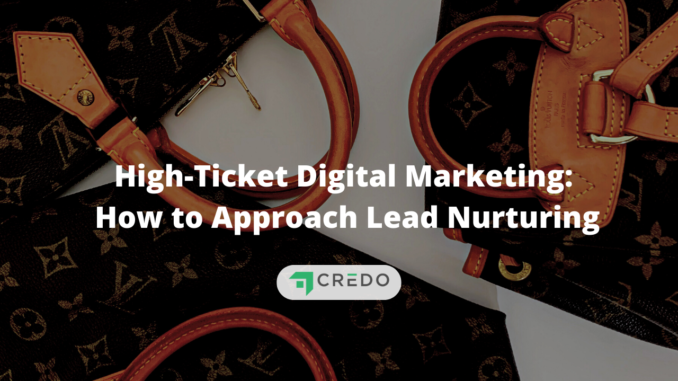
High-ticket digital marketing revolves around selling premium-priced products or services. While it holds the potential for substantial profits, mastering this niche demands a well-crafted strategy and a relentless commitment to lead nurturing to woo potential customers.
This article explores the key components of a successful high-ticket marketing strategy and how to nurture high-ticket leads effectively. The two central questions answered are:
What Is High-Ticket Digital Marketing?
High-ticket digital marketing is a specialized approach to sales, targeting discerning customers for exclusive and top-tier offerings. Unlike traditional strategies that paint with broader strokes, it focuses on a select group of buyers willing to invest more in premium products.
The defining characteristic of high-ticket digital marketing is its focus on quality over quantity. Rather than pursuing a high volume of low-cost transactions, a high-ticket marketing strategy emphasizes nurturing a smaller, but more lucrative, customer base.
High-ticket marketing isn’t limited to a specific industry or niche. It can encompass various sectors, including luxury goods, high-end services, premium software solutions, exclusive memberships, consulting services, and high-value digital products.
There are other methods of marketing high-ticket items, such as high-ticket affiliate marketing, which utilizes high-ticket affiliate programs to push select products. The highest-paid affiliate marketer is someone who invests in the right kind of affiliate program and engages in strategic affiliate marketing tactics.
Regardless of the exact method, though, selling high-ticket items requires a precise image of the sales funnel and intense marketing efforts.
The Key Elements of High-Ticket Digital Marketing
There are eight key elements of high-ticket digital marketing:
Now that you understand the central elements of high-ticket digital marketing let’s explore how lead nurturing forms the backbone of any successful sales strategy.
What Is Lead Nurturing?
Lead nurturing builds relationships with potential customers over time by providing valuable content and personalized interactions. It aims to educate potential customers about your offerings and help them move through the sales funnel until they are ready to purchase.
Why Is Lead Nurturing Important for High-Ticket Digital Marketing?
Luxury brands like Rolex, Louis Vuitton, and Lamborghini have built trust and established themselves as premium products over decades of meticulous branding. These brands rarely need to market their products because their reputation speaks for itself.
However, most luxury products do not have the same level of brand recognition. They have longer sales cycles and require more time and effort to convert a lead into a customer. Lead nurturing is a way to even the playing field and extend the sales cycle, keeping potential customers engaged until they are ready to purchase.
After all, high-ticket items are more expensive than lower-priced items, so potential customers are more likely to have concerns or questions before purchasing. Lead nurturing is a proven way to address these concerns and questions and build trust with hesitant customers.
By providing valuable content and personalized interactions, you can show potential customers that you are an expert in your field and genuinely interested in helping them. By extension, this instills trust in the products or services you sell.
How to Nurture Leads for High-Ticket Digital Marketing
Ultimately, lead nurturing is the process of turning potential buyers into paying customers. While lead nurturing can apply to any industry and offerings at any price point, it is particularly beneficial for high-ticket products and services.
Aside from providing trust-inducing content and personalized interactions, here are a few more actionable tips for nurturing leads for high-ticket digital marketing:
Types of High-Ticket Digital Marketing Campaigns
There are several types of high-ticket digital marketing campaigns that businesses can use. These include:
The Importance of Tracking and Measuring Results
By tracking metrics like leads generated, conversion rate, average customer value, and return on investment (ROI), you can see which campaigns are working and which are not.
The more data and metrics you track, the easier it is to adjust your strategy as needed and ensure you’re getting the most out of your efforts.
Using a CRM system and an analytics platform like Google Analytics can help you track your results more effectively. A CRM system will allow you to keep track of your leads and interactions with your company, while analytics will give you information about where customers are entering your funnel.
Here are some of the benefits of using a CRM and analytics to track your results:
Wrapping Up
With a purposeful approach and a dedication to meeting your audience’s needs, high-ticket digital marketing can open doors to substantial profitability and long-term success for your business.
By prioritizing lead nurturing and implementing the tips outlined in this article, you can significantly enhance your chances of success in the high-ticket digital marketing landscape.
Remember, stay focused on building trust, credibility, and genuine connections with potential customers through valuable content and personalized interactions.
High-Ticket Digital Marketing Made Easy—With Credo
Maximize your high-ticket digital marketing success through the Credo Network.
Our specialized digital marketing partners can help your business sell high-priced items with a strategic and sustainable marketing strategy. From tailored tactics to expert lead nurturing, we connect you with teams who elevate your business.

Leave a Reply